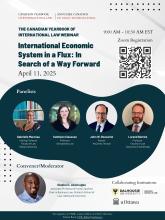Invitation - Inaugural Canadian Yearbook of International Law Webinar
The panelists in this inaugural webinar of the Canadian Yearbook of International Law will focus on some of these emerging questions. Comprising of academia, practice and policy experts, our panelists seek to shed light on some of the nagging issues of our day in search of a way forward.
